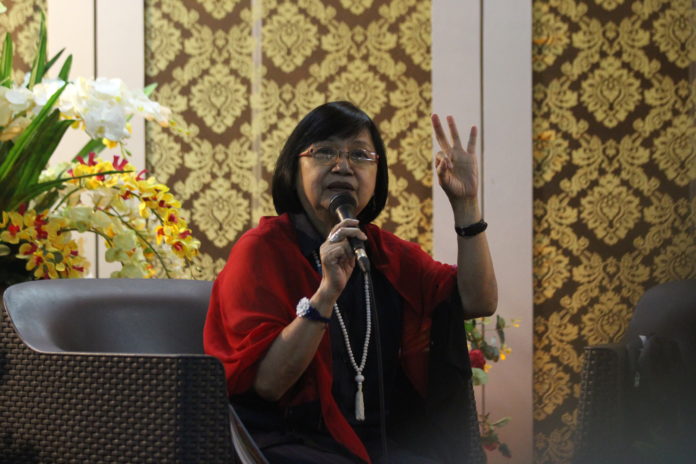IT MAY be the oldest of its kind in Asia, but not too many people know that the Silliman University National Writers’ Workshop is patterned after the Iowa Writers’ Workshop in the United States.
National Artist for Literature Edith Tiempo and her husband Edilberto Tiempo had taken part in the US workshop famously directed by the American writer Paul Engle. They replicated it in an Asian setting and amid the idyllic surroundings of the Protestant campus in Dumaguete City in Negros Oriental starting in 1962.
Fifty-five years hence, the Silliman workshop has produced many of the Philippines’ top writers. It was Engle who later founded the Iowa’s International Writing Program (IWP) for other writers in other countries and not necessarily writing in English to bask in the Iowa creative surroundings.
Last year, the IWP’s Filipino fellow was UST faculty member and award-winning fictionist in Filipino Eros Atalia. He is also the first Thomasian to join Iowa since the late Ophelia Alcantara-Dimalanta in 1990.
On April 20-22, largely through Atalia’s initiative, 21 alumni fellows from around the world gathered in UST for a reunion, the first in the history of IWP.
The alumni fellows took part in the International Conference on Education, Literatures, and Creative Writing, which was sponsored by the UST College of Education and United States Embassy, and supported by the Varsitarian.
The alumni fellows were led by no less than current IWP director Christopher Merrill, who delivered the opening talk, “The Role of IWP in Promoting International Understanding, Peace and Equality,” in which he compared music lessons to the Iowa writing workshops.
“You could actually learn to become a writer,” said Merrill. “The fact is [that] you learn to become a musician, you learn to become a teacher… you go to school to accomplish these things. So if we can do that in music and teaching, why not do it also in writing?”
National Artist for Literature Bienvenido Lumbera, said in his lecture that literary works can influence their readers’ views on the realities of the society.
“Kung susulat ka tungkol sa kwento o tula, kapag nabasa ‘yan ng mga audience na maaabot mo, mayroong realidad na pumasok sa iyo. At ‘yung realidad na ‘yun ang nais mong ipakita sa pamamagitan ng pagsusulat,” he said.
Last year’s IWP fellows who discussed “Experiences of Nations with their Literatures and its Role in the Global Discourse” were Ukamaka Olisakwe (Nigeria), Vladimir Poleganov (Bulgaria), Tse Hao Guang (Singapore), Zhou Jianing (China), and Alice Yousef (Palestinian Territories).
Filipino IWP fellows also highlighted the new role of information technology in teaching creative writing in the midst of different platforms and media.
Poet and IWP 2007 fellow Mookie Katigbak-Lacuesta emphasized the role of social media in establishing a community of both readers and writers.
“Social media is about engagement. I think what social media and media help us do is really to foster or build a community where people can really feel that we can talk about our [literary] work,” she said.
“Technology is something that we can really talk with and especially in line with what creative writing tries to do. Different social media actually help us to create and foster communities, which are important to beginning writers,” Katigbak-Lacuesta added.
Atalia, who teaches Filipino at the Faculty of Arts and Letters, recognized Wattpad as an online writing platform appealing to a wider audience.
“When it comes to literature, we look for alternative platforms. Young Filipino writers are hooked on online publishing, writing and reading. They have built a new community where they can share stories,” Atalia said.
Other local IWP fellows who gave the updates on teaching creative writing were Mark Angeles (2013) and Ian Rosales Casocot (2010).
University of Iowa (UI) has been dubbed the “writing university” for being the original developer of the Master of Fine Arts degree in Creative Writing and for operating two world-renowned writing programs—the Iowa Writers’ Workshop and the IWP.
Largely because of UI’s writing programs, Unesco has proclaimed Iowa City the third “City of Literature” following Edinburgh in Scotland and Melbourne in Australia.
Since IWP was founded in 1967, there have been 42 Philippine writers who have been named fellows and stayed in IU for several months to write and interact with other writers from other countries.
The first Filipino IWP fellow was a Thomasian and a Varsitarian alumnus—Wilfrido Nilledo (1967). The next fellow was another Thomasian and Varsitarian alumnus, Cirilo Bautista (1968).
Other Thomasians cum Varsitarian alumni who have become IWP fellows are Ophelia Alcantara-Dimalanta (1990) and Rogelio G. Sicat (1990) and Atalia (2016).













